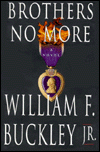Friday, June 18, 2004
Book Review

Brothers No More (A Blackford Oakes Novel)
One of the nice things about being (mostly) done with school is that I've rediscovered reading for pleasure. I've read a lot of genres over the years, sometimes focusing on one or the other- horror, sci-fi, classics, mysteries, novels, whatever really. As a young person one tends to think that one is a (x) kind of reader: I'm a sci-fi fan! (except for all the sci-fi that stinks), or later, I'm a fan of novels! (except for all the ones that stink). It's the same with music. The younger music afficionado tends to have just one style, perhaps just one artist or composer. But as one ages and grows more sophisticated, one learns that what is interesting is what is good, not what fits a particular definition.
That's just prelude, really, and has nothing to do with this book, except to say that I liked this book, but only because it was good. It didn't even particularly matter that it was written by one of my heroes of political commentary (although that's what piqued my curiosity to buy it). If it weren't good, I wouldn't read any more of Buckley's fiction and instead just read his commentary. Just as, for example, I like Sean Penn's movies, but don't much value his political insights (I just resisted a strong urge to put scare quotes around that last word).
Brothers No More is a novel by William F. Buckley about a subject, or perhaps one should say in a genre, that he visits often- that is, the Cold War. This book isn't about the Cold War at all, though, which is why perhaps 'genre' is better than 'subject'. The Cold War is just the backdrop for a story that is simply about human nature.
It's the story of two school friends who fight in Italy together during WWII. One of those friends reveals a deep character flaw in that fighting, a flaw that the other friend helps him cover up. But the revelation of this flaw ends up working a surprising result- as the one friend becomes starkly aware of his own weakness, he struggles to overcome his flaw by developing his deficient character, while the other friend, believing himself to be superior to his friend due to the revelation of the flaw, is blinded to his own flaws and thus does not struggle to mitigate them, but rather allows them to bloom into full flower. The friends are followed through the next few decades as their lives take very different paths, but who are always linked by the sister of one who married the other, and by the memories of the days in Italy when so much was revealed about them.
I've always known that Buckley was a great writer. He's known for his prodigious vocabulary and his very expressive commentary. But he's a very terse, natural fiction writer, which might seem like a conflicting skill set. It's not a hugely substantial book, and spends little time philosophizing or sermonizing about the subject. He lets the story tell itself. You can tell that he's a writer with a sense of humor as well, as he allows himself to be the target of the hatred of one of the sympathetic characters:
To round out the political coverage, the Times told her to do a feature on Conservative Party candidate William F. Buckly, Jr. She spent a few days reading his books, his columns, and listening to one of his campaign speeches. She reported to the City Editor that she could not do a feature on him, but would gladly volunteer to serve on it if ever an execution squad were organized.
She's a complete liberal, and yet Buckley makes her one of the good guys (gals?). And he does it not in some obvious patronizing way to prove that he was just writing fiction, not politicizing, and the reader barely even notices, because Buckley IS just writing fiction and not politicizing.
As a side benefit, one learns a few things about FDR, WWII, Vietnam, and other subjects of this period of history. Like any good work of fiction set in a historical setting, it teaches about its setting in a way subtle enough to not intrude on the story.
But more important, it teaches about the human subject. At the end of the day, this is the only real subject there is in fiction, or at least the only one I'm interested in. I learned long ago that I did not find certain sci-fi books interesting and others very dull because the one had superior laser gun fights or more interesting spaceships, but because the one more truthfully revealed the human character reacting in the environment. It's the same with any genre- the genre is just the canvas that the author uses to paint or sketch or sculpt or render what's really interesting- the only thing that's really interesting- the human being, interacting.
Another interesting thing has happened to me, as I become increasingly involved with people on a professional level- I find myself increasingly drawing on good fiction for insight into how I can expect people to behave. I find this one of the most trustworthy predictors of human behavior. I say to myself, If this were a fairy tale or a folk tale or a good novel, and there were a character acting like that person, what would I expect would happen to that character by the end? Is he the villain or the hero of the piece? It's usually guided me accurately. Good fiction is the human race's repository of natural wisdom, and I felt like this book added a few more things to my small repository.
